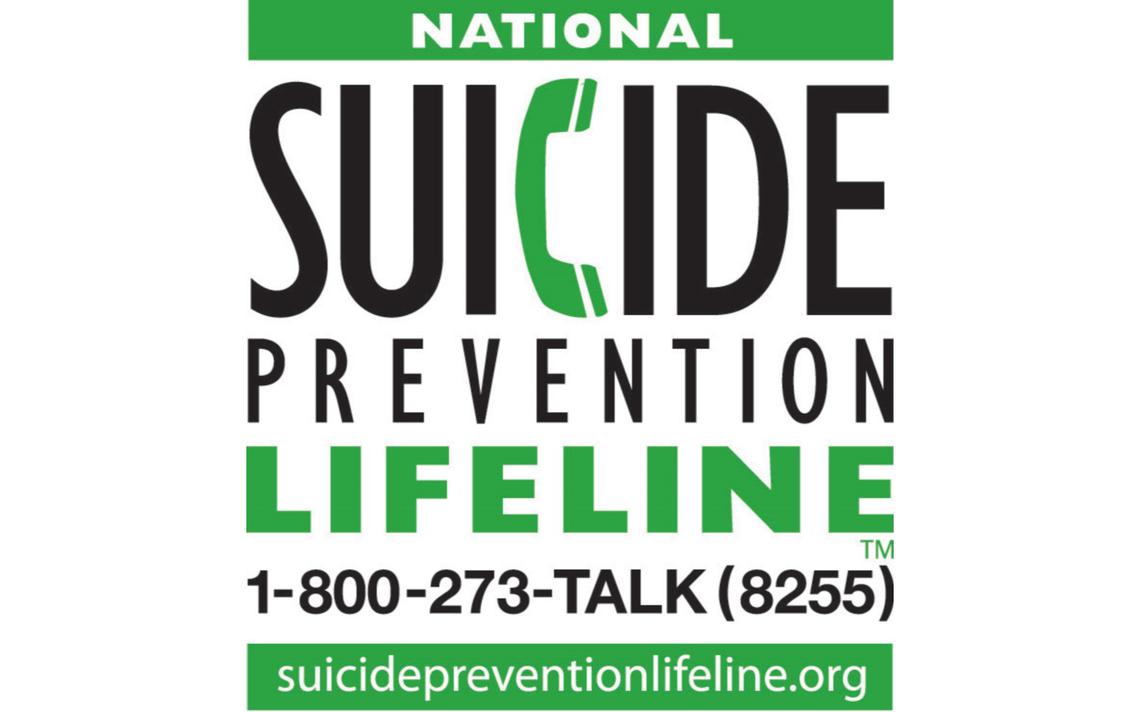Finding My Purpose
By Rebecca Ann Lombardo
I’ve always been extremely hard on myself. I think those of us who struggle with depression frequently are. I know that I have a tendency to compare myself to others who don’t have to deal with mental illness. Are they more successful than I am? Do they have a better house? A great job? I’m realistic enough to know that everyone has burdens to carry. Yet it’s hard for me to be optimistic about my life when I can barely get out of bed while my friends are leading fabulous lives.
I’ve worked very hard over the last few years to come to the realization that I am not a failure. The thought creeps into my brain often, but I’m constantly battling it. Suffering through more than 20 years of bipolar disorder and a suicide attempt doesn’t improve my feelings about myself. It’s extremely difficult to turn those thoughts around and tell yourself other people wouldn’t have survived what you’ve been through.
I’ve often struggled with finding my true purpose. It wasn’t until I truly hit rock bottom that I started to become more self-aware. In June of 2013, I succumbed to the symptoms of my illness. I firmly believed that I was not capable of doing anything worthwhile in this lifetime. I decided that my family and friends would be better off without me around and I attempted suicide. I will never forget the look on my husband’s face while they worked on me in the ER. Even thinking about it now gets me extremely emotional. I’m incredibly lucky that I wasn’t successful that day. It has allowed me to put my life into the proper perspective. With a great deal of time to reflect, I came to the realization that I had a voice. With that voice, I was going to try to change the way people perceive mental illness. I would begin a journey of trying to end the stigma.
It started with my blog. Once I made it public, it became an important platform. I had no idea that I could reach so many with my words. I was thrilled to learn that there were people out there who felt I was helping them! I started to consider the possibility of my blog becoming a book. I taught myself some of the ins and outs of social media. The mental health community on Twitter has also been extremely supportive. Every day, more people would come forward to tell me that my words resonated with them. I was starting to see the future. I was put here on this Earth to be an advocate for the mentally ill.
I won’t lie, there have been days when I lost my path. If someone reacted negatively to me or my story, it hit me hard. I received a nasty, threatening email claiming that I was a liar and that I would never help anyone. I was called a selfish narcissist. Never in my wildest dreams did I think my words would be turned against me like that. I’m certainly not sharing my story to look good! I feel like it’s quite the contrary. However, being on the receiving end of something like that hit me hard; The effects lasted days. I truly think having bipolar disorder is a big part of that. We all feel things much deeper. It’s especially hard when the story you’re telling is about your life, and someone says terrible things about it. It feels like a personal attack. Nothing worth doing is easy, so I stayed the course.
It is comforting for me to know that most of my critics have more than likely never had to fight a battle inside their own head every single day. I’m exhausted from that fight, but I’m still moving forward. Finding my purpose in life took a lot longer than I would have expected, but I try not to live in the past.
Am I still hard on myself? Do I still compare myself to others? At times. I think I probably always will. Low self-esteem in certainly a symptom of bipolar disorder. It’s something that I deal with every time I look in the mirror…every time I write. Is it good enough? Am I good enough? One of the hardest lessons I’ve ever had to learn is about being enough. I am enough has become my mantra.
I’m thankful to have finally found my voice, and I’m using it to effect change. We have a lot of work to do, but I firmly believe we can accomplish our goals of putting an end to the stigma surrounding mental illness. I will keep talking. I will keep telling my story. If I help even a handful of people, it will have been worth it.

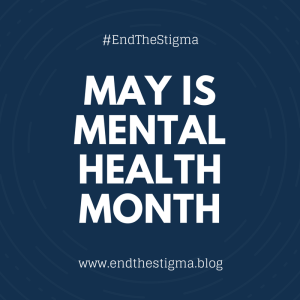 This month is Mental Health Month!
This month is Mental Health Month!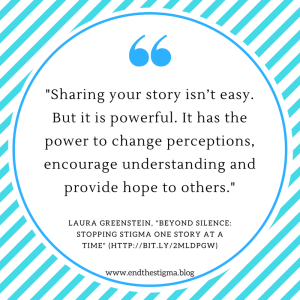 There are so many mental health advocates out there who share their stories about their mental health experiences in an effort to help end the stigma that is still so often attached to mental health issues. I would like to thank these people for opening up and sharing their personal experiences, which can sometimes be a scary and intimidating thing to do. Thank you to everybody who is working to promote awareness and understanding– you are doing very important work!
There are so many mental health advocates out there who share their stories about their mental health experiences in an effort to help end the stigma that is still so often attached to mental health issues. I would like to thank these people for opening up and sharing their personal experiences, which can sometimes be a scary and intimidating thing to do. Thank you to everybody who is working to promote awareness and understanding– you are doing very important work!
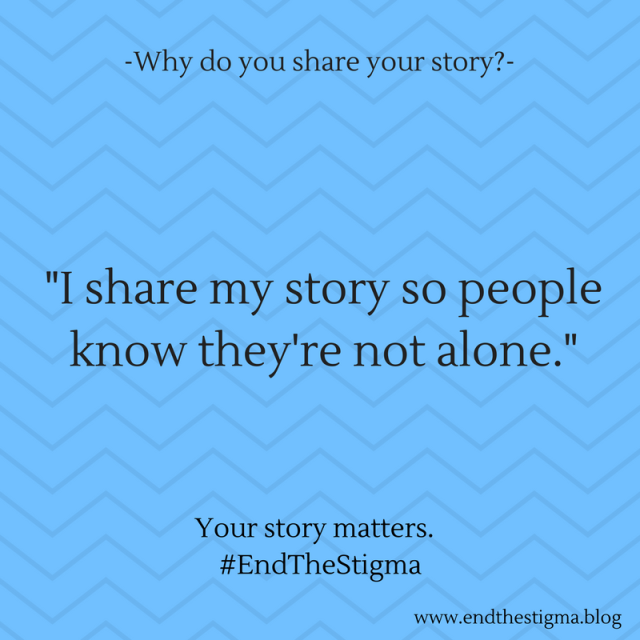
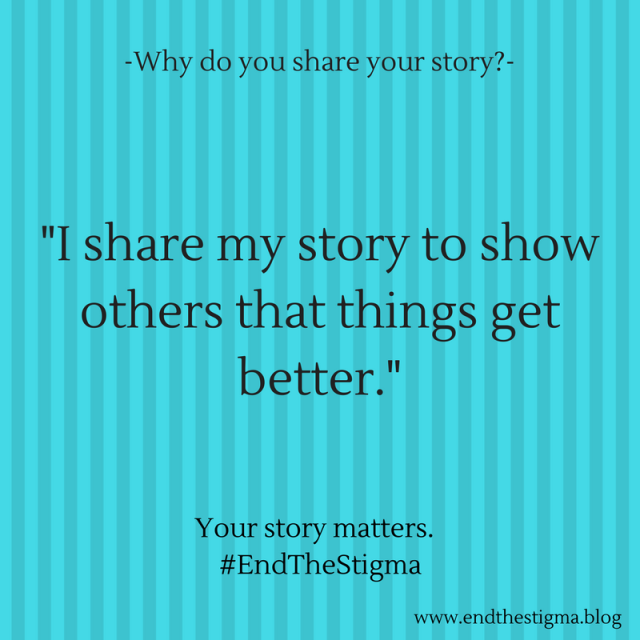


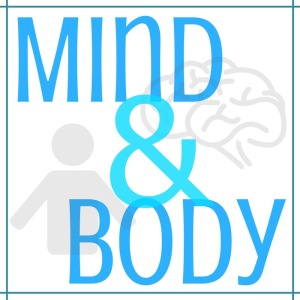 When you think about the term “health,” what first comes to mind? Physical health? Mental health? Many people place more of an emphasis on physical health, but mental health is just as important. In fact, mind and body are more connected than you might think! Many physical illnesses can increase your risk for certain mental health issues. This post will focus on Type 1 diabetes (T1D) and the effect that it can have on mental health.
When you think about the term “health,” what first comes to mind? Physical health? Mental health? Many people place more of an emphasis on physical health, but mental health is just as important. In fact, mind and body are more connected than you might think! Many physical illnesses can increase your risk for certain mental health issues. This post will focus on Type 1 diabetes (T1D) and the effect that it can have on mental health.
 …you can’t always tell that someone is depressed just by looking at them. This could also be the face of someone with depression:
…you can’t always tell that someone is depressed just by looking at them. This could also be the face of someone with depression:

 Excerpt from
Excerpt from  Utilise the resources you have available to get started
Utilise the resources you have available to get started Tap into existing community resources
Tap into existing community resources  Link in with other mental health services
Link in with other mental health services
 Keep persisting
Keep persisting
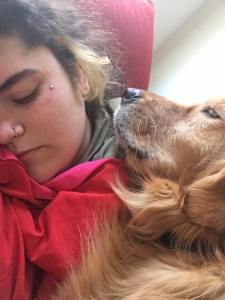


 Kaitlin: These are my babies. They keep me strong. I got the torbie Ariel (the one in front) specifically as therapy cat. She is amazingly affectionate
Kaitlin: These are my babies. They keep me strong. I got the torbie Ariel (the one in front) specifically as therapy cat. She is amazingly affectionate Ann:
Ann:  Letha: My char char Binks pup. She will come up when she senses I’m hurting and nuzzle me,make me pet her she snuggles me in bed every night and is just a great emotional support all around
Letha: My char char Binks pup. She will come up when she senses I’m hurting and nuzzle me,make me pet her she snuggles me in bed every night and is just a great emotional support all around Hannah: My dog, Shiloh does wonders for me. There’s nothing better than a happy dog greeting you at the door after a long night of class. I’m a student clinical mental health counselor and see a lot of value in the emotional support dogs can have for anyone. Whether it be snuggling next to you when you’re down or making you go outside because they want to play fetch. Dogs are invaluable in many ways ❤
Hannah: My dog, Shiloh does wonders for me. There’s nothing better than a happy dog greeting you at the door after a long night of class. I’m a student clinical mental health counselor and see a lot of value in the emotional support dogs can have for anyone. Whether it be snuggling next to you when you’re down or making you go outside because they want to play fetch. Dogs are invaluable in many ways ❤ Sam: My dog Bella is my support system, I have depression, anxiety, ASD, DID, OCD, suicidal tendencies and self harming behavior and if I’m having a rough day she never fails to make me smile.
Sam: My dog Bella is my support system, I have depression, anxiety, ASD, DID, OCD, suicidal tendencies and self harming behavior and if I’m having a rough day she never fails to make me smile. Audrey: This is Tig. He meets me when I get home and keeps me company as I live alone. He curls up next to me as I do work or crafts reminding me I am not alone. I also have a chronic illness and knows when I don’t feel well. He curls up around my arm and relaxes me till we both sleep.
Audrey: This is Tig. He meets me when I get home and keeps me company as I live alone. He curls up next to me as I do work or crafts reminding me I am not alone. I also have a chronic illness and knows when I don’t feel well. He curls up around my arm and relaxes me till we both sleep.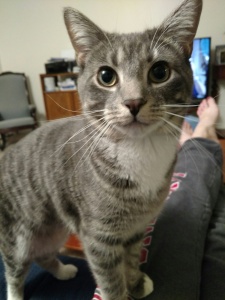 Lauren: Dexter is the best little buddy that I could ever ask for! He makes me laugh a lot, he keeps me company all the time, and he makes me so happy. Loving him and taking care of him is very beneficial for my mental health, and I don’t know what I’d do without him!
Lauren: Dexter is the best little buddy that I could ever ask for! He makes me laugh a lot, he keeps me company all the time, and he makes me so happy. Loving him and taking care of him is very beneficial for my mental health, and I don’t know what I’d do without him!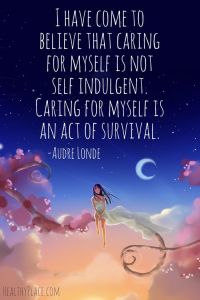 This past fall I began my first semester of graduate school as a Clinical Mental Health Counseling student. It was a stressful and exhausting semester since I was working part-time and choreographing a high school musical on top of being in school full-time, but I made it through and I now have a better idea of what kind of school/work/theatre/relaxation balance I need in order to be less stressed out.
This past fall I began my first semester of graduate school as a Clinical Mental Health Counseling student. It was a stressful and exhausting semester since I was working part-time and choreographing a high school musical on top of being in school full-time, but I made it through and I now have a better idea of what kind of school/work/theatre/relaxation balance I need in order to be less stressed out.